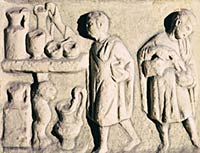The idea of resistance
A Roman senator named Pupius Piso once ordered his slaves not to speak unless spoken to. He had no time for idle talk. He also arranged an elegant dinner-party at which the guest of honour was to be a dignitary named Clodius
'... psychological warfare ... always existed between master and slave.'
At the appropriate time all the guests arrived except Clodius. So Piso sent the slave responsible for having invited the guest of honour to see where he was - several times - but still Clodius did not appear. In despair Piso finally questioned the slave: 'Did you send Clodius an invitation?' 'Yes.' 'So why hasn't he come?' 'Because he declined'. 'Then why didn't you tell me earlier? 'Because you didn't ask.'
This anecdote was recorded, about AD 100, by the Greek moralist Plutarch. It is a story that presupposes a constant tension between slave and master in the ancient Roman world, and is a striking illustration of how a lowly Roman slave could outwit his superior master.
Technically Roman slaves were the property, the chattels, of their owners, held in a state of total subjection. But to outwit an owner as Piso's slave did was to win a victory in the game of psychological warfare that always existed between master and slave.
For unlike other forms of property, slaves were human beings with minds of their own, and they didn't always obey their owners as unthinkingly as they were supposed to. They had the capacity to resist the absolute authority their owners formally exercised, and when Piso's slave crushingly embarrassed his master by obeying his instructions to the letter, for a moment (at least) he placed Piso in the inferior position that he normally occupied himself.
He found, in other words, a way to assert himself, to exert power against the powerful, so that the asymmetrical roles of master and slave were suddenly inverted.
Published: 2003-08-19




Bookmark with:
What are these?